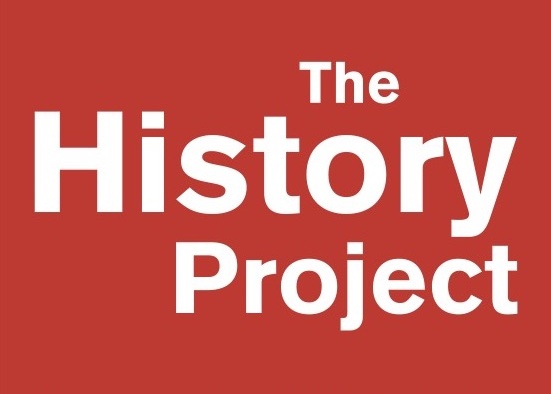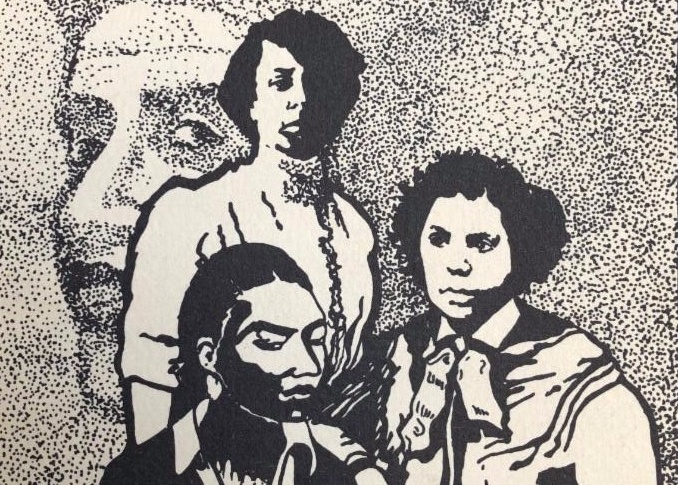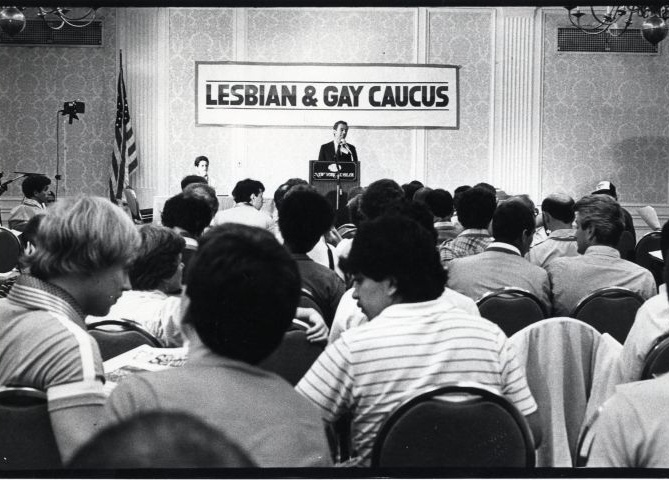Sort by:
Here’s to another 40 years, with your help
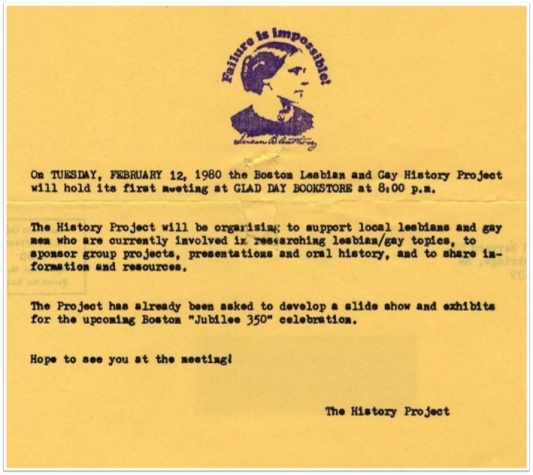
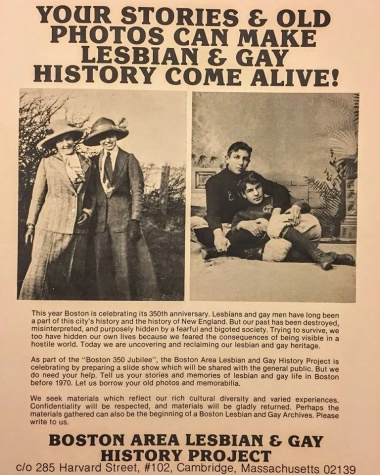
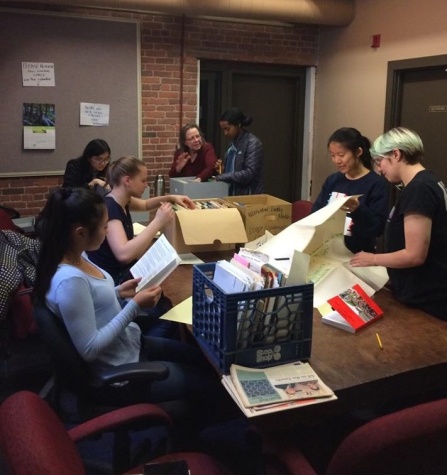
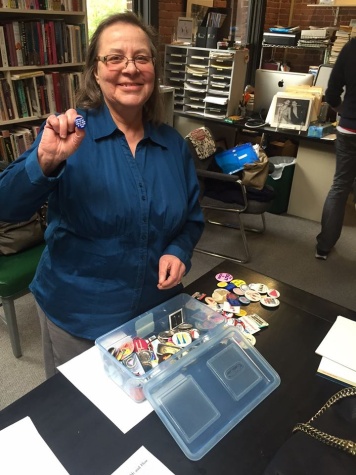
Today, we take LGBTQ history as a field for granted. But not so long ago, it didn’t exist. Without our history, we have no identity. That’s why I wanted to tell you this story and ask you to consider an end-of-year gift in support of our important work.
It was November 1979, and someone told me that the community historian Alan Bérubé (1946-2007) was giving a slideshow about “passing women.” I’d met him before and decided to go.
I was living at The Women’s Center and teaching women’s history at the Goddard-Cambridge Graduate School for Social Change. Although I was curious about how life was for people like me in the past, I knew little about our history.
The slideshow, called Lesbian Masquerade: Some Lesbians in Early San Francisco Who Passed As Men, was fascinating. Born in Springfield, Mass, Bérubé had moved to San Francisco and helped start a gay and lesbian (as the terms were used then) history group there. By the late 1970s, he was touring the country with his slideshow, inspiring viewers to see themselves as a people who made and were part of history. It is difficult to imagine now how new the subject matter was in 1979. I remember one of the slides had a headline: “She drank, she swore, she even chewed tobacco.”
A group of us stayed afterwards to talk to Bérubé. Joe Interrante, who was a graduate student at Harvard, suggested we form a Boston history group. Our first meeting was on February 12, 1980, at the Gay Community News office, 28 Bromfield Street. This became the date of the founding of The History Project.
We quickly decided to create a slideshow of Boston gay and lesbian history. In celebration of the 350th anniversary of the founding of Boston, the city formed a committee, Boston Jubilee 350, which gave The History Project its first grant of $200 for the slideshow. A Lesbian and Gay Task Force was formed as part of Jubilee 350 that produced a pamphlet called A Guidebook to Gay Boston - Its History and Resources. Joe Interrante wrote an article for the pamphlet, “From the Puritans to the Present: 350 Years of Lesbian and Gay History in Boston.”
By April 1980, we had completed the first edition of the slideshow and showed it at Boston University, and at two bars, Somewhere and Playland. Between 1980 and 1981, we took the slideshow to the New York City gay and lesbian history group, as well as to Oberlin College, MIT, Harvard, the Seacoast Alliance in New Hampshire, and several locations in Maine. We wrote articles for Gay Community News and continued gathering archival materials. In the 1980s, AIDS took a toll on The History Project, as it did everywhere. We lost beloved members and their partners. There was a prevailing sense of emergency and shock but through it all, we worked on. With so much loss, we were more determined than ever to preserve our history.
Milestones in the years that followed included the Public Faces/Private Lives exhibition at the Boston Public Library’s Copley Square branch in 1996, which was one of the best-attended events in the library’s history, drawing more than 50,000 visitors. That exhibition formed the basis for the 1998 book Improper Bostonians: Lesbian and Gay History From the Puritans to Playland.
In 2000, we began renting space at 29 Stanhope Street where we finally had a place to store the archives and to invite the public in to see and learn from them. We’ve since produced community curated exhibits including ¡Aqui Estamos!, Black & Gay in Black & White, The Queer East, Millennium Rainbow, Above & Beyond: Our Community Responds to HIV/AIDS, and Stonewall 50. Since 2009, our annual HistoryMaker Awards celebration has honored leaders in our community both long term and emerging.
We host monthly Out of the Archives events including movies, game nights, and talks by authors and artists. In the warmer months, we host LGBTQ walking tours, sometimes partnering with other organizations. Our annual flagging party, which we call Hanky Panky, has become a popular staple. In the past ten years, we’ve acquired more than a hundred new collections, recorded dozens of oral histories, and have become one of the largest community-based LGBTQ history archives in the United States. So many people (you may well be one of them) have played a crucial role in creating and nurturing The History Project. I wish I could name each of you and thank you personally.
Most of our work is done with little fanfare by exceptionally dedicated volunteers and board members. Every week, researchers contact us because there is no other place to find the answers they need. A volunteer comes by looking to feel connected to their history and to others in their community.
I wish you could be here when a student group visits. It’s often the LGBTQ student who speaks up, leading the discussion. You see that student sitting taller, speaking a little louder than usual, taking pride in their history, and knowing they are connected to a brave, beautiful story. The other students look at them in a new way. Those are the moments you help to create when you support our work.
As we look to The History Project’s 40th anniversary in 2020, we hope that you will continue to partner with us in preserving, protecting, and shining a light on our shared past. You can make your tax-deductible contribution by visiting historyproject.org/support or by sending a check to The History Project, 29 Stanhope Street, Boston, MA 02116.
Here’s to another 40 years, with your help.
Support The History Project with a one-time or recurring gift.
Top Related Stories
History Project Receives Staffing the Humanities Grant from Mass Humanities
BOSTON, MA (JULY 22, 2022) The History Project (THP), Boston's LGBTQ+ community archives, was recently named [...]
BOSTON, MA (JULY 22, 2022) The History Project (THP), Boston's LGBTQ+ community archives, was recently named [...]
Bulletin: Barbara Henry and a Black Lesbians Bibliography (February 2020)
This month's Bulletin looks at a book we have in our archives, Black Lesbians: An Annotated [...]
This month's Bulletin looks at a book we have in our archives, Black Lesbians: An Annotated [...]
We condemn the violent attack on the United States Capitol
The board and staff of The History Project unequivocally condemn the violent attack on the United [...]
The board and staff of The History Project unequivocally condemn the violent attack on the United [...]
